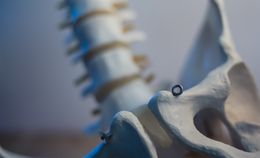I want to describe to you a rather obscure tidbit pertaining to estrogen and its relationship to thyroid function. Low thyroid function is something that I talk a lot about because it affects a great many people whether they know it or not. Indeed, the thyroid gland is very misunderstood and is certainly mistreated through the mainstream approach. But the thyroid gland itself aside, this article is focused on how thyroid hormone activity (not thyroid hormone production) can be hindered due to imbalances in the sex hormone estrogen.
When looking at thyroid hormones, or any hormones really, it is important to differentiate between the protein bound and free forms of the hormone. When a hormone is created by a gland it is immediately bound up with a carrier protein whose job it is to get that hormone to where it needs to go without being destroyed or lost along the way. Once the hormone is where it needs to be that carrier protein is removed and the hormone is "free" to do its job. That is why these hormones are called "free fraction" or "free hormones".
In the case of thyroid hormones there is a specific carrier protein called Thyroid Binding Globulin. It just so happens that when there are elevated levels of estrogen the amount of Thyroid Binding Globulin in the blood also goes up. This increased number of binding proteins hold onto more of the thyroid hormone which works to hinder them from doing their job. Remember, protein bound hormones can't bind to their receptor. They just float around in the blood. So if you were to do a basic thyroid screen you would usually be looking for the protein bound form (generally due to the lower cost of the test) and everything might look fine. The Thyroid is producing plenty of hormone and the paperwork all looks great. But why then is this woman still having trouble losing weight, losing her hair, struggling with low energy, and not pooping very often? These are all low thyroid symptoms which exist even though the actual hormone levels are normal. "Go home, there is nothing wrong with you". Right? Hmmm....
The reason that these symptoms persist is because the elevated estrogen induces a low thyroid state by stopping the free form of the hormone from binding to the receptor. For all intents and purposes this person is low thyroid. The unfortunate part is that the average blood workup won't account for the interplay between estrogen and thyroid Binding Globulin.
A careful history looking for high estrogen conditions like breast cancer, breast cysts, endometriosis, uterine fibroids, or hormone replacement therapy for example should all come into play when considering complaints of low thyroid function. This is thinking outside the box of mainstream medicine. These cases are missed all the time which is unfortunate. It is also of course a great idea to have a look at estrogen levels and there is even a test for Thyroid Binding Globulin.
Let's face it... Someone who is experiencing low thyroid symptoms for any reason is generally low energy. And all too often these people slip through the cracks of the conventional approach where most of the time all that is tested for is TSH. The solution may be a simple as just looking for the right thing.
References:










